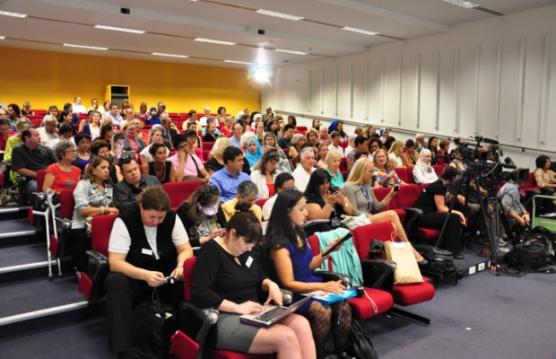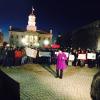Dear Professor Pattison
We write to express our concerns regarding the new ‘opt out’ policy on lecture recording that is being piloted across the University this semester. Our concerns are both pedagogical and ethical. In this letter we present these concerns for the University’s consideration.
The University has identified student retention as a significant problem. There is already significant evidence that lecture recording has a negative impact on student attendance. The pilot ‘opt out’ policy, which seeks to universalise lecture recordings, will only compound this trend. Student attendance at lectures and issues of student retention are related. The University should be developing policies that engage the students more with university life, not providing opportunities for them opt out of that experience.
Findings from a study conducted by Drs Anna Boucher and Lynne Chester show that there are clear negative effects of lecture recording on attendance. The study analysed the learning outcomes for 1500 first year students in Political Economy and Government over a two-year period. According to the authors:
Lecture attendance is negatively correlated with the presence of lecture recordings at the University of Sydney. The estimated effect is a 14% reduction in attendance.
This amounts to an estimated indirect reduction in final marks of approximately 0.5 to 0.6 marks via the reduced beneficial effect of lecture attendance (1 per cent significant level).
Lecture recordings also show a ripple-on effect on tutorial attendance of -2.7%, which amounts to an estimated indirect effect in final marks of –0.369 (1 per cent significant level).
Source: initial findings from Lecture Capture Study, Drs Anna Boucher and Lynne Chester, funded by the Teaching and Learning Initiative Award, Faculty of Arts and Social Sciences, 2011.
We believe that lectures are a learning experience based on being present and are concerned that this this policy will re-shape student’s expectations as to what constitutes a lecture, and what is required from the learning experience it represents. In effect, signalling to students that lecture attendance is not required sends the wrong message about what a university education involves. In particular, this is the wrong message to send to first year students.
To be clear, ours is not, in any way, a statement on those colleagues who choose to utilise lecture recordings. In fact, some signatories to this letter record their lectures. Rather, it is a statement about respecting individual teaching choices, and diversity in teaching practices, rather than the homogenisation and imposition, that this shift from the current ‘opt in’ to the piloted ‘opt out’ policy represents.
Which leads us to our ethical concerns.
First, a policy that makes lecture recording the default setting does not respect those who, for pedagogical reasons, do not want lectures recorded and freely available. The lecturers who choose to opt out are then asked to justify their request. There are, however, no standardised criteria for subsequently accepting (or not) their justification, by the Dean, or their delegate. In effect, instead of making both choices equal and legitimate, the opt-out policy puts those who choose to opt out on the back foot. Moreover, with this policy the University risks creating tension between the ‘opt out’ lecturers and their students. Indeed, one important damaging effect is that it provides grounds to students who want recordings to be able to challenge those lecturers who choose to opt out.
Second, as it is being rolled out, the policy is revealing itself to be inequitable: teachers of first year units may not apply for opt outs. Although we understand this may be faculty-specific, the University should be aiding, not punishing, those who are doing the hard work of teaching first years. A policy that applies inequitably and differentially to different teaching levels, and is more constraining for 1st year coordinators, is uncollegial.
Third, we do not find that the concerns about privacy, with regards to the rights of both the students and the lecturers have been adequately addressed, including in the ‘Lecture Recording in 2015 FAQs’ document.
Fourth, although we know this has begun to be recognised, we are deeply concerned at the lack of consultation. Such a fundamental change to the teaching environment should not be introduced without detailed consultation with the staff who will ultimately bear responsibility for implementing it.
We understand that the policy has been deployed as part of a broader e-learning strategy. We agree that universities have to embrace new forms of technology and consider new modes of teaching delivery. However, technology cannot be the answer to all problems and in some instances can worsen them. We are unconvinced that the case has been made that lecture recordings will enhance the learning experience.
In sum: This policy is problematic on both pedagogical and ethical grounds. For all of these reasons, we respectfully request that the University abandon the ‘opt out’ route, and return to the current ‘opt in’ policy, which has not, in our view, been proven dysfunctional.
This would enable both those who do, and those who do not, want to use lecture recordings to continue to be able to do so equally.
We look forward to your response.
Yours Sincerely,
Charlotte Epstein- Government and International Relations
Ariadne Vromen- Government and International Relations
Anna Boucher- Government and International Relations
Graeme Smith- Government and International Relations
Gil Merom- Government and International Relations
Colin Wight- Government and International Relations
David Schlosberg- Government and International Relations
Susan Park- Government and International Relations
Peter Curson- Centre for International Security Studies
James Reilly- Government and International Relations
John Mikler- Government and International Relations
Betsi Beem- Government and International Relations
Ben Goldsmith- Government and International Relations
James Der Derian- Centre for International Security Studies
Thomas Wilkins- Centre for International Security Studies
Anika Gauja- Government and International Relations
David Smith- Government and International Relations & US studies centre
Diarmuid Maguire- Government and International Relations
Jake Lynch- Peace and Conflict
Giovanni Navarria- Sydney Democracy Network
Robert MacNeil- Government and International Relations
Adam Morton- Political economy
Susan Banki- Sociology
Sarah Phillips- Centre for International Security Studies
Martijn Konings- Political economy
Yasmine Musharbash- Anthropology
Karl Maton- Sociology
Stuart Rosewarne- political economy
Bill Dunn political- economy
Fran Collyer- Sociology
Frank Smith- Centre for International Security Studies
Madeleine Pill- Government and International Relations
Jingdong Yuan- Centre for International Security
Susan Schroeder- political economy
Damien Cahill- Political economy
Gyu-Jin Hwang- Sociology
Gaynor Macdonald- Anthropology
Elizabeth Hill- political economy
Terry Woronov- Anthropology
Robbie Peters- Anthropology
Cynthia Hunter- Anthropology and public health
Amanda Elliot- Sociology
Fiona Gill- Sociology
Stephen Mills- Graduate School of Government
Gaby Ramia- Graduate school of Government
Minglu Chen- Government and International Relations
Joanne Kelly- Graduate School of Government
Lily Rahim- Government and International Relations
Antje Kuehnast- FASS
Frances Clarke- History
Bronwyn Winter- French Studies
Benedetta Brevini- Media and Communication
Sarah Gleeson-White- English
Dilip Dutta- Economics
Julie-Ann Robson- SOPHI
Yaegan Doran- Linguistics
Nick Riemer- English and Linguistics
Avril Alba- Hebrew, Biblical and Jewish Studies
Kristie Miller- Philosophy
Alec Pemberton- Sociology
Eric Csapo- Classics & Ancient History
Anjalee Cohen- Anthropology
Chiew Hui Ho- Chinese Studies
Roger Benjamin- Art History and Film Studies
Peter Kirkpatrick- English
Jelle Stoop- Classics and Ancient History
Su-kyoung Hwang- Korean Studies
Bruce Gardiner- English
Dalia Nassar- Philosophy
Rosie Findlay- Performance Studies
Monika Bednarek- Linguistics
Judith Beveridge- English
donald wright- Economics
Ben Brown- Classics and Ancient History
Pat Watson- Classics and Ancient History
William Foley- Linguistics
Michael Lewis- Department of Japanese Studies
Mark Allon- Indian Subcontinental Studies
Greg Martin- Sociology and Social Policy
Fiona Giles- Media and Communications
Huw Griffiths- English
Kunal Sengupta- Economics
Natalya Lusty- Gender and Cultural Studies
Caroline Yarnell- Government and International Relations
Brendon O’Connor- US Studies
Peter Morgan- European Studies
B Dexter HOYOS- Classics & Ancient History
Jonathan Newton- Economics
James Martin- Linguistics
Tiho Ancev- Economics
Ki-Sung Kwak- Korean Studies
Suzanne D. Rutland- Hebrew, Biblical & Jewish Studies
Ruth Phillips- Faculty of Education and Social Work
Julia Kindt- Classics and Ancient History
Elisabeth Valiente-Riedl- Sociology and Social Policy
Graham White- School of Economics
Alana Mann- Media and Communications
Lionel Babicz- Japanese Studies
Ryan Griffiths- Government and International Relations
Justin Hastings- Government and International Relations
Louisa Peralta- Education and Social Work
Jacqueline Manuel- Faculty of Education and Social Work
Gail Mason- Law
Helen Proctor- Faculty of Education and Social Work
Pierre Rognon- School of Civil Engineering
Minkang Kim- Education and Social Work
Peter Rose- Law
Michael Muir- Architecture
Anne Twomey- Law
Robyn Backen- Sydney college of the Arts
Tim Allender- Education and Social Work
Shae McCrystal- Law
Murray Lee- Law
Peter Marks- English
Lesley Laing- Education and social work
Kurt Iveson- Geosciences
Belinda Smith- Law
Craig Lyons- Geography
Susan Colmar- Faculty of Education and Social Work
david kinley- law
Shahadat Uddin- Civil
Elaine Baker- Geoscience
Chris L. Smith- Architecture
Rebecca Millar- Law
Judith Keene- History
Chris Murphy- Anatomy and Histology
suzanne plater- Public Health
Arlie Loughnan- Law
Jaime Gongora- Faculty of Veterinary
Dmytro Matsypura- Business Analytics
Peter Windsor- Veterinary Science
Andrew Dart- Veterinary Science
Michael Kirkpatrick- Aerospace, Mechanical and Mechatronic Engineering
Artem Prokhorov- Business Analytics
James Young- Government and International Relations
Anne Fawcett- Veterinary Science
Lucia Sorbera- Arabic Language and Cultures
Sanaa Zaki- Faculty of Veterinary Science
Meg Vost- Veterinary Science
Sara Oscar- Sydney College of the Arts
Navneet Dhand- Faculty of Veterinary Science
Ken Cruickshank- Faculty of Education and Social Work
Luke Nottage- School of Law
Christopher Neff- Government and International Relations
Tailoi Chan-Ling- Anatomy and Histology (Medecine)
Roger Pamphlet- Pathology
Daniel Oron- Business
Min Chen- Biological Sciences
Francesco Borghesi- Italian Studies
Elizabeth May- Biological Sciences
















